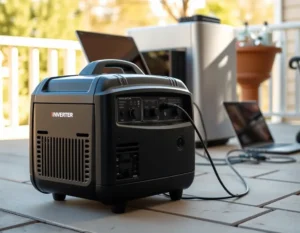Elegir el aceite correcto para un generador de luz es fundamental para asegurar su rendimiento óptimo y prolongar su vida útil. Sin embargo, muchas personas no saben cuál es el tipo de aceite más adecuado para su generador ni con qué frecuencia deben cambiarlo. En esta guía completa, te explicaremos qué aceite lleva un generador de luz, los beneficios de usar aceites de alta calidad, y te daremos consejos prácticos para elegir el mejor aceite según tus necesidades. Sigue leyendo para obtener toda la información que necesitas para mantener tu generador en perfectas condiciones.
Tipos de aceites para generadores de luz
Cuando se trata de saber qué aceite lleva un generador de luz, es crucial entender los diferentes tipos disponibles y cuál es el más adecuado para tu equipo. Los aceites para generadores se pueden clasificar principalmente en dos categorías: aceites minerales y aceites sintéticos.
Aceites Minerales:
- Características: Los aceites minerales se derivan del petróleo crudo y se refinan para eliminar impurezas. Son más económicos y ampliamente disponibles.
- Uso: Son adecuados para generadores que operan en condiciones normales y no están sometidos a cargas extremas.
- Ventajas: Su principal ventaja es el costo, siendo una opción accesible para el mantenimiento regular.
Aceites Sintéticos:
- Características: Los aceites sintéticos se producen mediante procesos químicos avanzados, ofreciendo una mayor pureza y consistencia.
- Uso: Son ideales para generadores que operan en condiciones extremas, como altas temperaturas o cargas pesadas.
- Ventajas: Proporcionan una mejor protección contra el desgaste y la oxidación, lo que puede prolongar la vida útil del generador.
Aceites Semi-sintéticos:
- Características: Una mezcla de aceites minerales y sintéticos, ofreciendo un equilibrio entre costo y rendimiento.
- Uso: Recomendados para generadores que requieren un poco más de protección que la que ofrece un aceite mineral, pero sin el costo de un aceite completamente sintético.
- Ventajas: Ofrecen una buena protección y rendimiento a un costo moderado.
Conocer qué aceite lleva un generador de luz es esencial para mantener el equipo en las mejores condiciones posibles. Cada tipo de aceite tiene sus propias ventajas y es importante elegir el adecuado según las especificaciones del fabricante de tu generador y las condiciones de operación.
¿Con qué frecuencia se debe cambiar el aceite para generador?
Determinar la frecuencia de cambio de aceite en un generador es vital para su funcionamiento eficiente y prolongado. Saber qué aceite lleva un generador de luz no es suficiente; también es fundamental conocer cuándo y con qué frecuencia cambiarlo.
Recomendaciones del Fabricante:
- Guía del Usuario: La primera referencia debe ser siempre el manual del generador. Los fabricantes proporcionan recomendaciones específicas basadas en pruebas exhaustivas.
- Intervalos de Cambio: Generalmente, los generadores nuevos requieren un cambio de aceite después de las primeras 20-30 horas de funcionamiento para eliminar partículas de metal y otros residuos del proceso de fabricación.
Condiciones de Operación:
- Uso Intensivo: Si el generador se utiliza de manera intensiva o en condiciones extremas (altas temperaturas, polvo, humedad), es recomendable cambiar el aceite con mayor frecuencia, cada 50-60 horas de uso.
- Uso Moderado: Para uso moderado, un intervalo de 100 horas de operación suele ser suficiente.
Indicadores de Cambio:
- Color y Consistencia: El aceite limpio debe ser ámbar y ligeramente viscoso. Si observas que el aceite se vuelve negro, espeso o presenta residuos, es una señal de que necesita ser reemplazado.
- Nivel de Aceite: Verificar regularmente el nivel de aceite y rellenar según sea necesario, pero sin exceder el límite máximo recomendado.
Mantenimiento Regular:
- Programación: Establecer un calendario de mantenimiento regular que incluya la revisión y cambio de aceite. Esto ayudará a evitar el desgaste prematuro y posibles fallos del generador.
- Registro de Mantenimiento: Llevar un registro detallado de cada cambio de aceite y mantenimiento realizado. Esto no solo ayuda a mantener un historial claro, sino que también facilita la identificación de patrones o problemas recurrentes.
Entender la frecuencia adecuada para cambiar el aceite es tan crucial como saber qué aceite lleva un generador de luz. Mantener un régimen de mantenimiento adecuado asegurará que tu generador funcione de manera óptima y prolongará su vida útil.
¿Qué aceite lleva un generador de luz?
Usar aceite de alta calidad en un generador de luz puede tener un impacto significativo en su rendimiento y durabilidad. Entender qué aceite lleva un generador de luz y optar por aceites superiores ofrece varios beneficios clave:
Protección Contra el Desgaste: Los aceites de alta calidad proporcionan una lubricación superior a las partes móviles del generador, reduciendo la fricción y el desgaste. Esto no solo prolonga la vida útil del generador sino que también minimiza la necesidad de reparaciones frecuentes.
Resistencia a la Oxidación: Un aceite de alta calidad es más resistente a la oxidación y la descomposición. Esto significa que mantiene sus propiedades lubricantes durante más tiempo y reduce la formación de depósitos y lodos que pueden obstruir los componentes del generador, asegurando un funcionamiento suave y eficiente.
Mejora del Rendimiento: El uso de aceites de alta calidad contribuye a un mejor rendimiento general del generador. Esto permite que funcione a su capacidad máxima y puede llevar a una reducción en el consumo de combustible, ahorrando costos operativos.
Resistencia a Condiciones Extremas: Los aceites de alta calidad están formulados para funcionar bien en una amplia gama de temperaturas y condiciones. Esto es especialmente importante para generadores que operan en climas extremos o bajo cargas pesadas, proporcionando una mejor protección y rendimiento.
Reducción de Emisiones: Optar por aceites de alta calidad también puede resultar en una menor producción de emisiones y contaminantes. Esto no solo es beneficioso para el medio ambiente, sino que también asegura el cumplimiento de las normativas ambientales.
¿Cómo elegir el aceite adecuado para tu generador?
Elegir el aceite adecuado para un generador de luz puede ser un desafío debido a la variedad de opciones disponibles. Aquí te ofrecemos una guía práctica para tomar la mejor decisión.
Consultar el Manual del Fabricante: El primer paso siempre debe ser revisar el manual del generador. Aquí encontrarás las especificaciones del aceite recomendado por el fabricante, incluyendo la viscosidad adecuada (por ejemplo, SAE 10W-30) para las condiciones de operación específicas de tu generador.
Considerar el Tipo de Generador: Los generadores diésel y de gasolina pueden requerir diferentes tipos de aceite. Asegúrate de seleccionar el aceite adecuado para el tipo de motor de tu generador. También es importante tener en cuenta las condiciones de uso; los generadores que operan en condiciones extremas pueden beneficiarse de aceites sintéticos que ofrecen mejor protección.
Factores Climáticos: La elección del aceite puede depender de la temperatura en la que opera el generador. En climas fríos, es preferible usar aceites que mantengan una buena fluidez a bajas temperaturas, mientras que en climas cálidos, se necesitan aceites que resistan la evaporación y el desgaste por calor.
Frecuencia de Mantenimiento: Considera la frecuencia de cambio de aceite recomendada para tu generador. Los generadores que se usan intensamente pueden necesitar cambios de aceite más frecuentes, por lo que un aceite de alta calidad que dure más tiempo puede ser más conveniente y económico a largo plazo.
Certificaciones y Normativas: Busca aceites que cumplan con las normas de calidad de API (American Petroleum Institute) o ACEA (Association des Constructeurs Européens d’Automobiles). Estas certificaciones garantizan que el aceite ha pasado pruebas rigurosas de rendimiento. Además, verifica si el fabricante del generador certifica ciertos aceites, indicando que han sido probados y aprobados específicamente para su equipo.
Asesoramiento profesional
¿Todavía tienes dudas sobre qué aceite lleva un generador de luz? No te preocupes, en JRH Power Generator estamos aquí para ayudarte. Nuestro equipo de expertos está disponible para brindarte asesoramiento personalizado y responder a todas tus preguntas sobre el mantenimiento y el cuidado de tu generador.
¿Por qué elegirnos?
- Experiencia: Con años de experiencia en el sector, conocemos a fondo las necesidades de cada tipo de generador.
- Asesoramiento Personalizado: Te ofrecemos soluciones adaptadas a tus necesidades específicas, garantizando el máximo rendimiento y durabilidad de tu equipo.
- Calidad y Confianza: Solo recomendamos productos y prácticas que hemos probado y en los que confiamos, asegurando que tu generador esté en las mejores manos.
No dudes en ponerte en contacto con nosotros para obtener más información y recibir la asistencia que necesitas. Haz clic en el botón a continuación y uno de nuestros especialistas se pondrá en contacto contigo lo antes posible.



